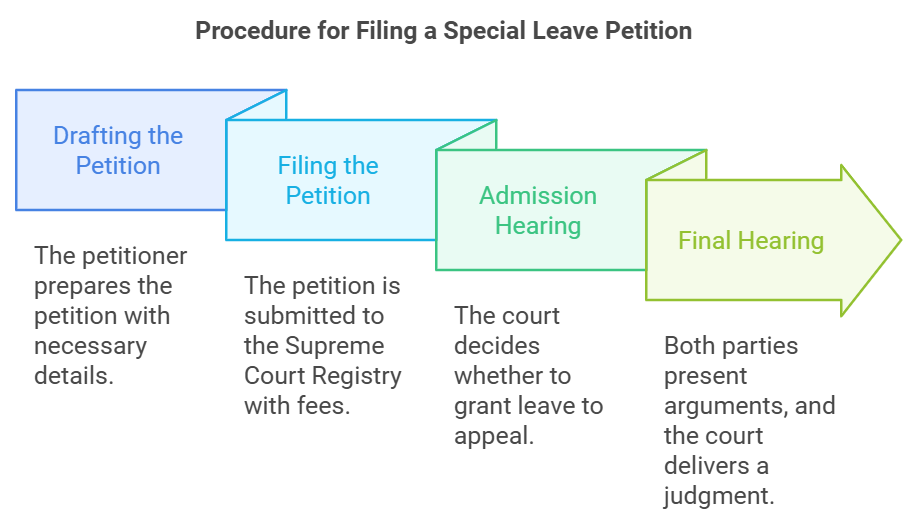Important Facts For Prelims
SC Prioritising SLPs Disposal
- 13 Dec 2024
- 5 min read
Why in News?
The Supreme Court (SC) has started prioritising hearing special leave petitions (SLPs) cases with the aim to reduce the high burden of cases filed each year, alongside a substantial backlog.
- As of December 2024, over 82,000 cases are pending in the SC, which has prompted the Chief Justice of India (CJI), to implement such strategies.
What is a Special Leave Petition (SLP)?
- About:
- A SLP is a discretionary appeal mechanism (Article 136 of the Constitution of India) allowing the SC to hear appeals against judgments, decrees, or orders of any court or tribunal.
- It is not applicable for Armed Forces Tribunals.
- A SLP is a discretionary appeal mechanism (Article 136 of the Constitution of India) allowing the SC to hear appeals against judgments, decrees, or orders of any court or tribunal.
- Origin:
- The concept of "special leave" is derived from the Government of India Act, 1935, which had recognized the prerogative to grant special leave for appeals.
- Key Features:
- This is an extraordinary jurisdiction of the SC, which enables it to address cases where no direct right of appeal exists.
- It is granted solely at the discretion of the SC, which may deny leave without providing reasons.
- It is applicable to both civil and criminal matters.
- When the SC grants an SLP, it transitions into a formal appeal, allowing detailed examination of the case and enabling both parties to present their arguments before a final verdict is delivered.
- It is typically invoked in cases involving substantial questions of law or a miscarriage of justice.
- Eligibility:
- Any aggrieved party can file an SLP against a judgment or order of a High Court or tribunal, especially where:
- A certificate of fitness for appeal to the SC has been denied.
- Substantial questions of law or injustice are involved.
- Any aggrieved party can file an SLP against a judgment or order of a High Court or tribunal, especially where:
- Time Limit to File a SLP:
- An SLP can be filed within 90 days from the date of a High Court's judgment.
- If the High Court refuses to grant a certificate of fitness for appeal to the SC, the SLP must be filed within 60 days from the date of such refusal.
- Procedure for Filing a SLP:
What are the Supreme Court Cases Related SLPs?
- In Laxmi & Co. v. Anand R. Deshpande (1972), the SC held that during appeals under Article 136, the Court may consider subsequent developments to expedite proceedings, safeguard the rights of parties, and uphold the interests of justice.
- In Kerala State v. Kunhayammed (2000) SC ruled that declining to grant an SLP does not invoke its appellate jurisdiction.
- This discretion ensures that the SC intervenes only in cases warranting judicial scrutiny.
- In Pritam Singh v. The State (1950), it was emphasized that the SC should exercise its powers under Article 136 sparingly, interfering with High Court decisions only in exceptional cases.
- Once an appeal is admitted, the appellant may challenge any erroneous legal findings by the High Court.
- In N. Suriyakala v. A. Mohandoss & Ors. (2007) SC clarified that Article 136 does not establish an ordinary appellate forum but grants broad discretionary powers to the Supreme Court to intervene for ensuring justice, rather than providing a right of appeal to litigants.
- Filing SLPs indiscriminately goes against the purpose of Article 136.
UPSC Civil Services Examination Previous Year Question (PYQ)
Prelims:
Q. With reference to the Indian judiciary, consider the following statements:
- Any retired judge of the Supreme Court of India can be called back to sit and act as a Supreme Court judge by the Chief Justice of India with the prior permission of the President of India.
- A High Court in India has the power to review its own judgement as the Supreme Court does.
Which of the statements given above is/are correct? (2021)
(a) 1 only
(b) 2 only
(c) Both 1 and 2
(d) Neither I nor 2
Ans: (c)





